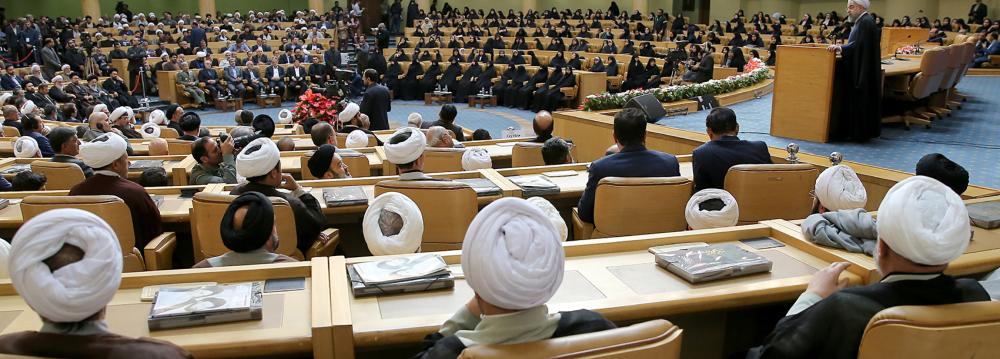President Hassan Rouhani ruled out any negotiations with the West to curb its missile program, arguing that Iran is complying with its Constitution that calls for the development of military capabilities to bolster the country's deterrence.
"Our Constitution requires our weaponry to be deterrent. We want nothing more. Our military power must deter threats and serve as an effective defense in the face of any eventuality," Rouhani said on Monday, as cited by his official website.
He was addressing a ceremony in Tehran to mark the martyrdom anniversary of Ayatollah Mostafa Khomeini, the son of the late founder of the Islamic Republic Ayatollah Ruhollah Khomeini, who was martyred during the popular uprising leading to the victory of the 1979 Islamic Revolution and overthrow of the US-backed dictator Mohammad Reza Pahlavi.
In a statement from the White House earlier this month, US President Donald Trump announced his refusal to recertify Iran's compliance with a high-profile nuclear deal struck with the United States and five other powers, namely Britain, France, China and Russia plus Germany.
The Republican president gave Congress 60 days to decide whether to reimpose economic sanctions on Iran, lifted under the pact in exchange for scaling down its nuclear program.
The Trump administration has issued several rounds of sanctions against Iran in a push to restrict its missile program and regional role as well.
It has called on Tehran not to develop missiles capable of delivering nuclear bombs. Iran says it has no such plans. Tehran has repeatedly pledged to continue its defensive missile capability in defiance of western criticism.
"No one can question the military power of another country, which has been designed in accordance with its Constitution and a defense doctrine," Rouhani said.
Western diplomats say European powers share some of these concerns but believe they should be dealt with in other forums and warn it would be a mistake to sacrifice the nuclear deal, which Trump has threatened to terminate.
There is broad support among US lawmakers for fresh pressure on Iran over its continued missile development and activities in the region, factors that Trump claims violate the "spirit" of the agreement.
The US House of Representatives is to vote this week on new sanctions on Iran's ballistic missile program and on Lebanon's Iran-backed Hezbollah resistance group.
Among other things, the ballistic missiles bill would toughen existing sanctions by going after entities with assets outside the United States if they were found to support Iran's ballistic missile program.
The Islamic Revolution Guards Corps has reacted by vowing to accelerate its missile development despite US and the European pressure to suspend it.
"Iran's ballistic missile program will develop and it will continue with more speed in response to Trump's hostile approach toward this revolutionary organization [IRGC]," it said in a statement on Thursday.


